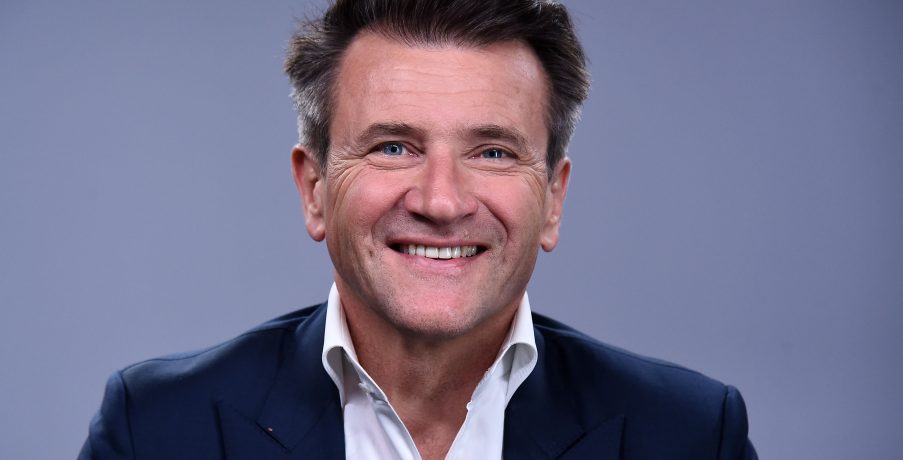
-
Robert Herjavec’s pandemic advice to business owners: ‘When you’re going through hell… keep going’
In Best Of, Featured, Guest, Interview, Latest, News Stories, Technology, The World, Top News, videosPost Views: 905By Neil A. Carousso
NEW YORK (WCBS 880) — “Shark Tank” star Robert Herjavec believes the coronavirus pandemic presents an opportunity for entrepreneurs to fill needs and shares his advice for overcoming adversity on the WCBS Small Business Spotlight, sponsored by BNB Bank.
“Whatever you start doing today, your business will not be doing that in a year. Things change. The world changes. You have to adapt,” he said, adding he prefers to invest in individuals rather than single businesses on ABC’s “Shark Tank” for that reason.
“The entrepreneur will always figure out the path and the entrepreneur will build a great team in order to figure out the path,” he said.
Herjavec told Joe Connolly and Neil A. Carousso he started his first business after he was fired and needed to make a mortgage payment. He started other businesses in economic recessions.
“In this kind of a time, don’t perfect your product, don’t spend all this time on your management team or buying better software to run your business. Go sell something,” the self-made entrepreneur emphasized when asked for his advice for owners. “Sales cures all ills and the harder the economy, the harder the macro conditions, the more you need sales.”
A record 80,820 Americans have taken the first steps into entrepreneurship this year; that’s 30.6 percent more new business applications than all of 2019, according to the U.S. Census Bureau.
Herjavec represents the embodiment of the American Dream. His family escaped the former Communist country Yugoslavia in 1970 when Robert was eight years old. His father was a successful manager in Yugoslavia, but was jailed 22 times for speaking out about the dangers of communism. They immigrated to Canada where Robert’s father Vladimir swept floors in a factory.
His upbringing shaped Robert as a kid who sought to make something out of nothing, later founding BRAK Systems, which he sold to then-AT&T Canada in 2000 for $30.2 million. He currently runs the Herjavec Group – a global cybersecurity firm with its headquarters in Toronto, Canada.
“I’ve been through hell and I’ve been through some really hard times,” he told WCBS 880, recalling advice he lives by, “When you’re going through hell, you’ve just got to keep going.”
Herjavec told Connolly and Carousso that business owners who are struggling right now should take an honest assessment of the company and the market and be in contact with their customers regularly.
“The worst thing you can do in this time is nothing,” he said, continuing, “Don’t let fear overcome you to the point that you’re that deer in the headlights. You just got to keep going.”
Herjavec says he and his fellow Sharks did not know if their businesses would survive at the outset of the pandemic. He has not seen his employees in-person since February 17.
“I’m running a $300 million business; I haven’t seen a single employee,” he said from his Los Angeles home, noting it’s difficult to motivate his remote Herjavec Group team on video calls. So, Herjavec began expressing his appreciation through premium, savory cookies and brownies from Bake Me A Wish – a New York-based company whose mission is centered on expressing gratitude and appreciation for employees and colleagues.
“My dad was this blue collar guy, worked really hard, swept floors in a factory, and he always said to me, ‘You should thank people for the opportunity,'” he explained, adding, “I was just looking for a way to say thank you.”
Now, the ‘Shark Tank’ star is extending personalized gift baskets to companies who want to share their appreciation for their workers ahead of the unprecedented holidays. You can see Bake Me A Wish’s corporate catalogue, endorsed by Herjavec, here.
“You don’t have to be a jerk, you don’t have to be mean and I think it’s the opposite,” the Shark said of succeeding in business. “You’ve got to empower people. You’ve got to lead people. You have to give people vision of where they want to go.”
Watch Joe Connolly and Neil A. Carousso’s conversation with Robert Herjavec above for more business advice and keys to pitching your idea, product or business on “Shark Tank” or any boardroom.
-
Stew Leonard’s builds “buffer stock” as COVID cases surge ahead of Thanksgiving
Post Views: 838By Neil A. Carousso
NEW YORK (WCBS 880) — Stew Leonard, Jr. is stocking up for a second wave of the coronavirus. He and his suppliers do not want to be blindsided like they were in March.
“They’re all anticipating at least a 20 percent increase in buffer stock,” Leonard told Joe Connolly and Neil A. Carousso on the WCBS Small Business Spotlight, sponsored by BNB Bank.
The second generation owner of Stew Leonard’s supermarket chain headquartered in Norwalk, Connecticut said he did not predict cleaning products, paper towels and toilet paper would be in short supply when the pandemic hit the United States eight months ago, but now, he is prepared as the virus surges in a majority of states with hospitalizations rising, too.
“Our backrooms are stuffed right now with product and we’re buying as much Bounty and Charmin as we can get right now,” Leonard told WCBS 880.
He’s been reflecting on his father’s advice from when he took over the family business in 1987 – 18 years after Stew Leonard, Sr. opened the original store.
Leonard, Jr. told Connolly and Carousso his father advised he pay attention to his customers and “be really nice to your suppliers,” because they are providing the quality product shoppers expect.“I’m calling them up and I’m on my knees. I owe a lot of favors right now,” Leonard laughed. “You know ‘Game of Thrones’ where the guy said I have to bend a knee? Well, I’ve had to bend a knee a lot here.”
He said he is informing his suppliers – local farmers and fisherman among them – that he is still in business and they are his priority.
“Sometimes there might be a hiccup and they need something delivered and I’ll have some of our people go and deliver it to them because they’re in a jam,” he said, adding, “I would expect our suppliers to do that for us, too.”
Leonard told WCBS 880 it is imperative business owners in the food industry listen to their customers because they have no data to indicate how to prepare for Thanksgiving this year.
“The only way you’re going to get a little handle on it is if you really just say, ‘I’m going to talk to five customers a day,'” he advised. “They’ll give you a feeling of what it’s like, whether they want delivery, whether they want curb side, how they’re shopping, what their Thanksgiving’s going to be like.”
Leonard surveyed thousands of his customers and found 9 out of 10 are having small Thanksgiving dinners this year with immediate family in accordance with Centers for Disease Control and Prevention guidelines. That influenced his decision to reduce his typical order of large turkeys weighing 24-25 lbs. by 20 percent; he bought 20-25 percent more smaller turkeys that weigh 15-16 lbs.
Stew Leonard’s has seen a 600 percent increase in online orders in the outset of the pandemic as the supermarket implemented “triple cleaning” procedures and got rid of in-store buffets and bagel trays to prevent the spread of COVID-19.
While families save on eating out and entertainment because of the pandemic, there is more demand for quality ground beef and wine at Stew Leonard’s.
“They want to still make that restaurant-style meal at their house so we’re seeing our porterhouse steaks (and) our filet mignons (are) incredibly high in sales, and also, all of our prime beef that we offer at Stew Leonard’s has gone up tremendously,” Leonard said.
He tells WCBS 880 he has not raised prices in the pandemic. In fact, he gave his employees an extra $2 an hour in the first months of the crisis. He is restoring that boost ahead of the holidays plus Leonard is giving his workers an extra week’s salary at year’s end.
Watch Joe Connolly and Neil A. Carousso’s conversation with Stew Leonard, Jr. above or listen to it on the WCBS Small Business Spotlight Podcast.
-
WCBS 880 business tips: 5 ways to change your sales
Post Views: 924By Neil A. Carousso
NEW YORK (WCBS 880) — Business owners are changing the way they sell to recover and grow during the coronavirus pandemic.
All three entrepreneurs on the WCBS BNB Bank Virtual Business Breakfast panel with Joe Connolly have adjusted their sales operations and strategies, increasing revenue as a result; they share advice to other owners on how to boost sales even in this tough economic climate.
1. Reduce Overhead
Satisfi Labs Co-Founder and CEO Don White says vendors are currently offering incentives for suppliers. You may be in a good position to negotiate.
#1 Reduce overhead@TheDonnyWhite tells @JoeConnollybiz how he cut costs at his tech company @satisfi at the outset of the pandemic before doubling his sales.
See 5 Ways to Change Your Sales: https://t.co/8BgOJhLsMr
📝: @NeilACarousso pic.twitter.com/oThSrlfS3q
— WCBS 880 (@wcbs880) October 22, 2020
“Now is a great time to shop for a better rate or a better priced option,” White said. “We were able to reduce our health costs by 40 percent going into 2021 just because of how we worked with our partner who wanted to retain us, and even though it’s 25 employees, they were very interested in offering us the ability to do that.”
The savvy tech entrepreneur says now is a great time to reduce your overhead going into next year.
2. Pivot to Boost Revenue
NTWRK president Moksha Fitzgibbons says small retailers should pivot online and attempt to move their current customer base to their e-commerce platform.
#2 Pivot to Boost Revenue
Moksha Fitzgibbons at @NTWRKLIVE developed an e-commerce platform for retailers to sell their products on a live stream.
See 5 Ways to Change Your Sales: https://t.co/8BgOJhLsMr@JoeConnollybiz @NeilACarousso pic.twitter.com/dtCSwJFFsR
— WCBS 880 (@wcbs880) October 24, 2020
“I would say do as much as you can to build that online revenue and try to grow that as efficiently, as effectively as you can, and then, reopen that store in a safe way to bring back your customer base, as best you can, and introduce them to your online piece,” Fitzgibbons said in response to an audience question from Anita Manfredonia who owns a boutique in Flushing, Queens named Pippy & Lily.
NTWRK is a livestreaming e-commerce application that has helped retailers pivot from brick and mortar to grow digital sales.
One example Fitzgibbons shares on the Virtual Business Breakfast is Chelsea-based artist Mr. Flower Fantastic who designs elaborate floral pieces for live events and showcases, including making a floral masterpiece of Serena Williams’ Nike Air Max 97 sneaker for the 2018 U.S. Open. NTWRK has a creative content deal with MFF that will rake in “seven figures plus” in revenue this year after event cancellations temporarily set the floral artist’s business back.
3. Know Who Your Customers Are
A key to changing your sales is understanding who your customers are by digging into your transaction data and social media analytics.
“Influencer marketing” is the new word-of-mouth marketing. Happy to hear from a Queens boutique owner who will carry 3 Moms Organics’ product in her holiday baskets after watching the Virtual #WCBSBizBreakfast with @JoeConnollybiz.
See more sales tips: https://t.co/QaIkJwj5F8 https://t.co/UA9I8t9lWz
— Neil A. Carousso (@NeilACarousso) October 25, 2020
“When we saw that it was a reorder, we put a handwritten note in there with an extra two-ounce bottle thanking them for ordering from us,” Jennifer Decker of Long Island-based 3 Moms Organics said of her personal touch.
Her customers became the company’s most influential spokespeople during the pandemic as they made their own posts and videos explaining and showing how their DEET-free product TickWise works to repel ticks and insects.
A combination of genuine influencer marketing and targeted Facebook advertisements accelerated 3 Moms Organics’ sales over 1,000 percent this year.
4. Help Others Who Are Struggling
White shared his conviction that the business community should help others who have been laid-off due to this crisis. One way to do that is through virtual networking made easier on LinkedIn.
#4 Help Others Who Are Struggling@TheDonnyWhite of @satisfi answers @LeslieHTayneEsq’s question about networking in a way we never thought!
Watch 5 Ways to Change Your Sales: https://t.co/8BgOJhLsMr@JoeConnollybiz @NeilACarousso @bank_bnb pic.twitter.com/efHyp91uIJ
— WCBS 880 (@wcbs880) October 27, 2020
“Some of those relationships have really benefited our company,” White said, noting that was not his objective. “I was able to provide them some benefits of either talking through what opportunities they were looking for, ways they can potentially help us, and then they would in turn say, ‘well, how can I help you?’ There was a reciprocal opportunity.”
His startup’s revenue doubled after shifting his sales operations from a regionally focused sales team to a vertical sales team whereby staffers focused on areas of expertise rather than geographic location since business travel was halted.
5. Be a Business for the Future
Fitzgibbons believes consumer behavior has changed permanently and entrepreneurs should look to fulfill needs in the marketplace.
#5 Be a Business for the Future@NTWRKLIVE president Moksha Fitzgibbons notes there are new needs in the pandemic economy and consumer behavior may have changed permanently.
See all 5 Ways to Change Your Sales: https://t.co/8BgOJhLsMr@JoeConnollybiz @NeilACarousso @bank_bnb pic.twitter.com/bfM7QpeLJV
— WCBS 880 (@wcbs880) October 29, 2020
“I used to go to Whole Foods all the time and now I order it through Amazon Prime.
I don’t think I’ll ever go back to a Whole Foods or certainly not with the frequency that I once did,” he shared, adding, “You need to think through that need case and make sure that you are well-positioned to be a business for the future and not one of the past.”Watch the WCBS BNB Bank Virtual Business Breakfast with Joe Connolly here.
-
WCBS BNB Bank Virtual Business Breakfast: Growth opportunities in the COVID crisis
Post Views: 711By Joe Connolly and Neil A. Carousso
NEW YORK (WCBS 880) — Successful entrepreneurs will often say they find opportunities amid challenges, but the coronavirus pandemic has thrown a curveball at a formerly booming economy that has disrupted industries. Some resilient businesses are now growing after making key adjustments to how they sell.
Three local entrepreneurs who have pivoted, recovered and increased revenue in the last seven months share how sales has changed in the pandemic economy on the WCBS BNB Bank Virtual Business Breakfast, hosted by Joe Connolly.
“We started to see a lot of consumption late at night, which just spoke to the fact that people were home more, they were social distancing,” said NTWRK president Moksha Fitzgibbons.
He told the panel he was nervous in March when they were forced to shutter production. NTWRK originally was a platform that hosted highly produced and high-quality video content for businesses. Now, it is part of a hot trend of livestreaming e-commerce in which the NTWRK application hosts vertical live video for retailers that sell their products directly on the app to prospective customers that the startup finds for business owners.
“The more content consumption equated to more product sales,” said Fitzgibbons whose revenue doubled from March to April after the quick pivot. NTWRK is projecting a 500-600 percent increase year-over-year.
He explained on the Virtual Business Breakfast how he helps traditional retailers, such as Mr. Flower Fantastic, based in the Chelsea neighborhood of Manhattan, make creative content that translates to sales since brick and mortar and experiential businesses are suffering amid the pandemic.
“In short order, by end of year, we’ll drive seven figures plus revenue for (Mr.
Flower Fantastic) around exclusive product drops in our livestreaming e-commerce application,” Fitzgibbons said.Don White, co-founder and chief executive officer of Manhattan artificial intelligence firm Satisfi Labs, saw revenue plummet to zero when all of his retail and entertainment clients – including Macy’s, Major League Baseball, Universal Orlando Resort and the Georgia Aquarium – were shut down in March. He credits their recovery to a shift of their sales operations from location to industry specialization by his staff since business travel was halted.
“Moving to a vertical sales team meant that someone who covered all the other aquariums could speak more intelligently about what aquariums are doing or need to get their customers back,” White explained.
“That verticalization and expertise goes a long way in terms of understanding of the category and truly being a partner with the client to give them the success that they need on the platform,” Fitzgibbons added.
Jennifer Decker, co-owner 3 Moms Organics, is up more than 1,000 percent this year, which she attributes to creative and educational content they use in targeted Facebook advertisements. Their most effective advertisement was what they call the “pink paper ad” in which Decker’s partner Lisa-Jae Eggert, who studied entomology and earth science, collected ticks in the high grass on the East End and demonstrates how they stay away from the border of a pink sheet of paper that she sprayed with their product TickWise – a DEET-free tick and insect repellant.
“She blew dry it to show even when it dries on your clothing that the ticks don’t want to go near it and that ad has definitely given us the most website sales,” Decker told Connolly and the panel.
White said when he made a “reopening roadmap” for the hospitality industry over the summer, he discovered one piece of content can be used in email newsletters, Facebook posts and advertisements, and other social media campaigns to acquire new customers within a limited marketing budget.
“I think it’s just very strategic, quality, small investments that can be transferred (across) a lot of channels,” he said.
Selling direct-to-consumer on their website is now 3 Moms Organics’ focus as opposed to traditional retail. TickWise is on the shelves of about 80 stores – many of which are seasonal on Long Island and closed in March. They are registered through the Environmental Protection Agency to sell in 48 states and Washington, D.C. 3 Moms Organics was recently approved by the EPA to sell in California and are pending approvals for Maine and South Dakota.
Decker and Eggert used their time wisely in the first three months of the pandemic to apply and receive the Minority and Women Owned Business Enterprise Certification (MWBE), which has opened new doors for additional revenue streams.
“(We’ve) networked within them to learn a little bit more about what we should be doing and what we should be targeting,” Decker said of recent certifications.
White, in an answer to an audience question from debt settlement attorney Leslie Tayne, Esq. of Tayne Law Group in Melville, Long Island, said he has made connections on LinkedIn that has replaced in-person networking during the pandemic.
“I have been open to helping people that were unemployed as a result of the pandemic, and honestly, some of those relationships have really benefited our company,” he said, stressing his personal conviction in members of the business community helping each other through crises.
Learn sales advice, growth strategies and ideas on pivoting and starting a new business to fill a need in the pandemic economy on the WCBS BNB Bank Virtual Business Breakfast with Joe Connolly. Watch the program above.
-
I’m Listening: Family finds mission in NY doctor’s death
Post Views: 2,087Shining the spotlight on mental health needs of health care workers
This interview is part of Entercom’s “I’m Listening” Campaign for Mental Health Awareness and Suicide Prevention. If you are in a crisis or have a family member or friend who needs help, you are not alone: Call 800-273-8255 or text TALK to 741741 for immediate help.
According to Jennifer Feist, her sister, Dr. Lorna Breen was in the middle of “a firestorm of illness” in March and early April dealing with COVID-19 at her Manhattan hospital and simply “couldn’t do it anymore.”
Dr. Breen’s suicide in late April grabbed headlines in The New York Times, shining a spotlight on the crisis of physician suicide, a crisis her sister said she never knew existed. As a result, Feist, a Charlottesville, Virginia attorney co-founded (with her husband Corey Feist) the Dr. Lorna Breen Heroes’ Foundation, dedicated to protecting the well-being of physicians and health care professionals.
The foundations website says Dr. Breen spent her career in practice at NewYork-Presbyterian Hospital in Manhattan and became the director of the emergency room at the Allen Hospital in 2008. It was in that same emergency room, early in 2020 that the COVID pandemic hit hard. Dr. Breen’s father, also a physician, told the Times how his daughter described for him “an onslaught of patients who were dying before they could even be taken out of ambulances.”
Feist sat down for an interview with us for the Entercom “I’m Listening” program, aimed at removing the stigma of asking for mental health help. Dr. Breen’s family had no idea she was struggling so badly early in the year. They knew the pandemic was beginning to arrive and they knew Lorna was working almost nonstop. Dr. Breen had no medical history of mental issues, no challenges that anyone knew of with anxiety and depression. Her risk factor for suicide was “she was a physician.”
Feist said it was the perfect storm.
“She was an emergency room physician in a global pandemic in the worst place in the world to be doing the worst job,” Feist said. In the middle of her work, Dr. Breen even contracted COVID-19, but was back at work within days of having been cleared to return. The spiral seemed to continue for Dr. Breen. She took a leave of absence and traveled to Virginia to seek help there. She died by suicide in late April.
Today, Feist and her husband are advocates for mental health care for front line medical professionals.
Related:
- Suicide Prevention Awareness Month: Resources for Those in Need
- Listen To the 2020 Edition of ‘I’m Listening’ – Talk Has the Power To Save Lives
- I’m Listening: How To Deal With Mental Health When Your Parents Don’t Understand
- I’m Listening: Falcons’ Hayden Hurst Recounts Isolation and Pain During College
- I’m Listening: Asking for help is not a weakness
- ‘America’s psychologist’ Jeffrey Gardere and Pastor Rasool Berry talk racial justice, mental health
“This is a real crisis and I didn’t know about it until my sister died,” Feist said.
“Physician suicide is at a crisis point in this country as is nurse suicide,” Feist added, pointing out that the rate of burnout anxiety and depression self-reported are “off the charts.”
The Feists’ are working with Virginia Sen. Tim Kaine on a bi-partisan bill in the U.S. Senate called the Dr. Lorna Breen Health Care Provider Protection Act. A companion bill for the House is also in the works. Both bills are aimed at preventing physician burnout, suicide in the medical profession, and providing mental health care for professionals who need it in the health care industry.
Feist said, “I believe there is a culture stigma in the community that says ‘you have to be tough, you can’t be a snowflake to get in here. Don’t say you need help. Don’t say you are scared. Don’t say you are worried.’ That’s got to change.”
The foundation is also focused on reforming the culture in medicine, including the licensing and credentialing process for doctors and residents.
“There is no shame. This is part of life,” says Feist. “It’s important what we learn and what we do about it.”
We asked what we all could do to help our health care providers. Feist said it could be as simple as reaching out to your own doctor or health professional to ask them how they may be doing in this stressful time. She says she often wondered what would have happened if someone would have asked that of Dr. Lorna Breen when they noticed she was struggling.
Feist says you can also help by supporting the foundation at www.DrLornaBreen.org and use the #StandWithLorna hashtag on social media.
https://omny.fm/shows/880-weekly-rewind/how-talk-has-the-power-to-save-lives
“I’d like to see health care organizations; I’d like to see hospitals; I’d like to see the hospital where my sister worked; others like that to provide mental health support, not just when there is a crisis and the house is on fire, but before there is a crisis,” Feist said. “Let’s provide the support for these people that they need.”
Neil A. Carousso executive produced Entercom New York’s video content for “I’m Listening LIVE,” which aired and was published across the digital platforms of WCBS-AM, WFAN-AM & FM, WCBS-FM, WNSH-FM, WNEW-FM, WNYL-FM and WINS-AM.
videos
Social Feeds

VIDEO: Told the airline to book us on the next flight out (SPONTANEOUS TRIP!)

VIDEO: The Taylor Swift Effect | WCBS Business Breakfast

VIDEO: Future of NYC | WCBS Business Breakfast

VIDEO: Reasons for New Yorkers to be Optimistic | WCBS Business Breakfast

VIDEO: NYC's AI Chatbot | WCBS Business Breakfast






